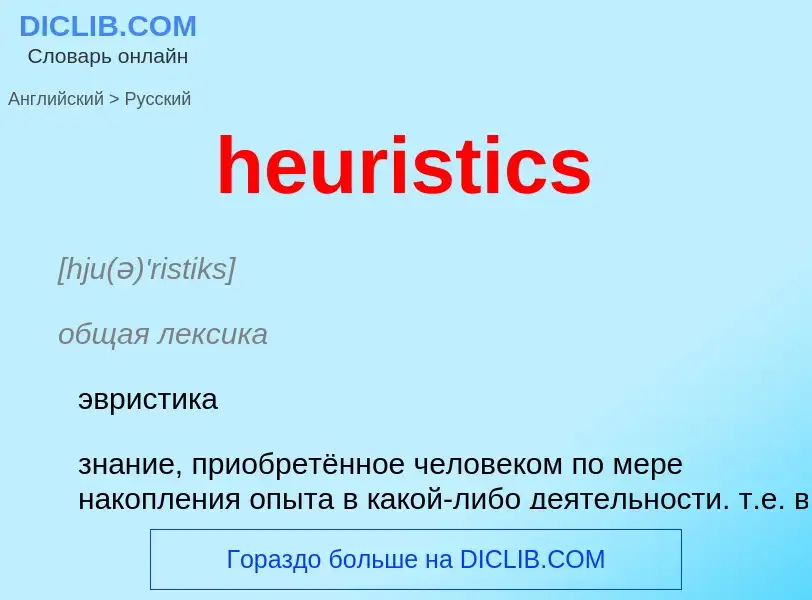Übersetzung und Analyse von Wörtern durch künstliche Intelligenz ChatGPT
Auf dieser Seite erhalten Sie eine detaillierte Analyse eines Wortes oder einer Phrase mithilfe der besten heute verfügbaren Technologie der künstlichen Intelligenz:
- wie das Wort verwendet wird
- Häufigkeit der Nutzung
- es wird häufiger in mündlicher oder schriftlicher Rede verwendet
- Wortübersetzungsoptionen
- Anwendungsbeispiele (mehrere Phrasen mit Übersetzung)
- Etymologie
heuristics - Übersetzung nach russisch
[hju(ə)'ristiks]
общая лексика
эвристика
знание, приобретённое человеком по мере накопления опыта в какой-либо деятельности, т.е. в решении практических задач определённого класса. Эвристические методы, в отличие от алгоритмических, не требуют исчерпывающей исходной информации, но не всегда гарантируют успех. Эвристики применяются в экспертных системах
существительное
логика
эвристика
Definition
Wikipedia
Heuristic (; from Ancient Greek εὑρίσκω (heurískō) 'I find, discover'), or heuristic technique, is any approach to problem solving or self-discovery that employs a practical method that is not guaranteed to be optimal, perfect, or rational, but is nevertheless sufficient for reaching an immediate, short-term goal or approximation. Where finding an optimal solution is impossible or impractical, heuristic methods can be used to speed up the process of finding a satisfactory solution. Heuristics can be mental shortcuts that ease the cognitive load of making a decision.
Examples that employ heuristics include using trial and error, a rule of thumb or an educated guess.
Heuristics are the strategies derived from previous experiences with similar problems. These strategies depend on using readily accessible, though loosely applicable, information to control problem solving in human beings, machines and abstract issues. When an individual applies a heuristic in practice, it generally performs as expected. However it can alternatively create systematic errors.
The most fundamental heuristic is trial and error, which can be used in everything from matching nuts and bolts to finding the values of variables in algebra problems. In mathematics, some common heuristics involve the use of visual representations, additional assumptions, forward/backward reasoning and simplification. Here are a few commonly used heuristics from George Pólya's 1945 book, How to Solve It:
- When experiencing a difficulty in understanding a problem, draw the architecture from all directions e.g. top-view, side-view, front-view.
- If you can't find a solution, try assuming that you have a solution and seeing what you can derive from that ("working backward"). AKA "what shape would it have" aka system-requirements.
- If the problem is abstract, try examining a concrete example.
- Try solving a more general problem first (the "inventor's paradox": the more ambitious plan may have more chances of success).
This is because only the general problem can provide to a specific problem—a context from which to draw meaning.
In psychology, heuristics are simple, efficient rules, either learned or inculcated by evolutionary processes. These psychological heuristics have been proposed to explain how people make decisions, come to judgements, and solve problems. These rules typically come into play when people face complex problems or incomplete information. Researchers employ various methods to test whether people use these rules. The rules have been shown to work well under most circumstances, but in certain cases can lead to systematic errors or cognitive biases.

